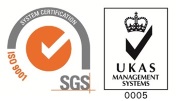News from TQC, Nottingham: Plastics - "when handling means assembly as well"
Explore the News & Careers Section
Explore the latest news from TQC and find out if there are career opportunities at the Nottingham headquarters.
featured in British Plastics & Rubber September 2003
The increasing trend towards supplying modules, or sub-assemblies, rather than just plastics components has created a need for localised assembly systems for use by plastics moulders.
TQC of Nottingham has built a business in part on supplying product handling and assembly systems for this situation, handling parts as small as mobile phones or latch mechanisms, to automotive bumper assemblies and external trim parts.
The company recently produced a number of pallet-based automatic assembly systems for smaller complex multi-part assemblies, one of which produced a range of glove box catch assemblies used in several high volume cars. The catch manufacturer needed to ensure that he could meet the quality and cost constraints imposed by the OEM, and opted for a fully automatic assembly system which required only a service operator, and ensuring the consistency of the assembly process. This uses a Flexlink pallet system with dedicated fixturing to suit the part being assembled. An advantage of this approach is that each separate assembly function is de-linked and so can be changed or added to should the product change. Within the system, individual mouldings and metal parts are bowl fed into dedicated assembly stations, each having inbuilt checking for part presence and correct assembly.
Other systems supplied have also included automatic unloading into the assembly cell by robot and automatic packing of the finished and checked parts at the end of the process.
At the other extreme of moulding size, TQC have provided a range of equipment for processing and assembling automotive bumpers and other external trim mouldings. In this case, most of the parts are post treated and painted in body colour after moulding, and due to the large size, are manually handled and stored during the subsequent assembly process.
The level of assembly varies with the moulding and design of vehicle, but a typical pair of automotive bumpers will carry fog lamps, parking sensors, number plate lamps, and wash wipe as well as a wide range of trim parts for the vehicle options. Although most of this assembly is done manually or semi-automatically there is still the need to support and orient the moulding, and to ensure that all the correct parts have been fitted and function correctly. Just in time figures very heavily, as all parts are made for a specific car and are only three hours from final assembly on to that vehicle on the track.
A recent set of machines supplied by TQC is based on a ‘spit roast’ arrangement allowing the operator to access both sides of the moulding as well as supporting the painted moulding only on the non-cosmetic face. Once loaded, the bumpers are held in place by vacuum, while the operator fits all the added components. The bumper moulding is bar coded, and this drives the machine to tell the operator exactly what combination of options are fitted to this specific part. As each component is fitted, a series of lights tells the operator, and in the case of the lamps and parking sensors, carries out an automatic function check, ensuring that when that bumper arrives on the assembly track, all the correct parts are fitted and work.
In addition to these examples, TQC has integrated a range of test modules into assembly systems, including leak testing (air decay and helium), electrical testing, and function testing of finished products.
TQC is also a member of a European consortium known as Assembly-Net, which is an open network of industrialists, academia and research establishments aiming at advancing and improving European competiveness for mini and micro assembly solutions. Much of this work is aimed at helping companies put together integrated assembly systems with the ability to change very quickly to match market trends.
For more stories similar to this please visit the British Plastics & Rubber website at https://www.britishplastics.co.uk/
For enquiries:
For further information, please e-mail sales@tqc.co.uk
